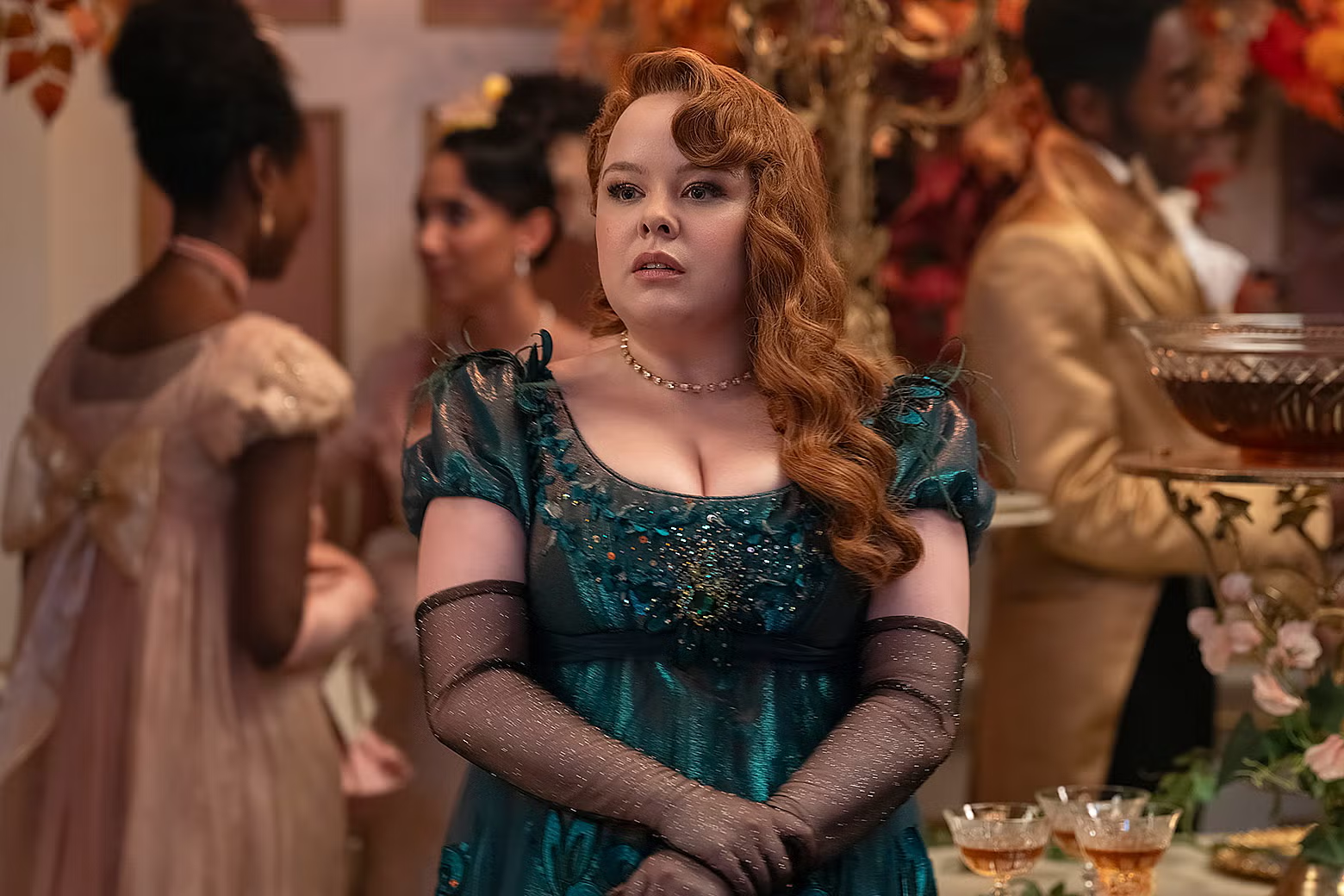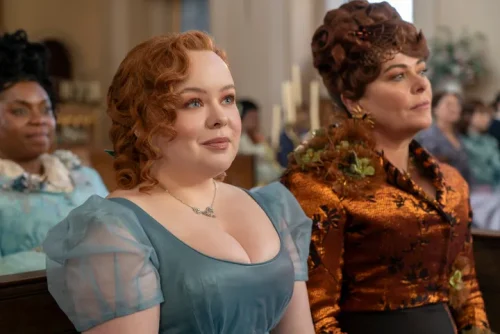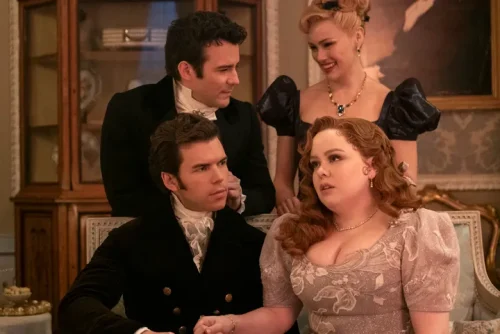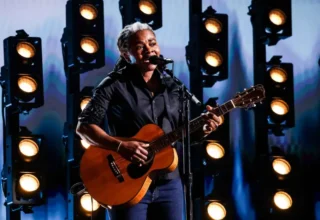The real surprise of the Netflix series’ final four episodes isn’t the friends-to-lovers romance.

“Who needs fresh air when there is fresh gossip?” quips Lady Danbury in the opening minutes of the second half of “Bridgerton” Season 3. It’s a sentiment to which both members of the ton ― that is, the upper stratum of society depicted in “Bridgerton” ― and fans of the show can relate, especially those who have been waiting four long weeks to hear Penelope’s answer to Colin’s post-carriage marriage proposal.
It spoils nothing to reveal that Penelope (played by Nicola Coughlan) says yes, or that she shares her news with the ton in her next installment of her gossip column, Lady Whistledown’s Society Papers: “Dearest Reader, while most seasons of our fair marriage mart follow a predictable pattern, this author likes it most when there is a surprise.”
Their engagement may be a shock to members of the ton, but both it and the progression of Colin (Luke Newton) and Penelope from friends to lovers will not surprise the viewer. The tension of Colin not knowing Penelope’s hidden identity, the threat her writing poses, and the implied social dangers of this revelation are predictable.
Instead, the true surprise of this season’s final four episodes is not the friends-to-lovers romance but the way “Bridgerton” highlights friendships, especially those between women, and the way it follows in the tradition of spinoff “Queen Charlotte” to explore what marriage really means.
While the first two seasons largely focus on why people get married (whether for love, duty or stability), this season follows in the footsteps of “Queen Charlotte” to examine what marriage means for a woman. How does it grant agency? How does it constrain it? What do you do if, like Penelope, you’ve managed to find independence and are now faced with the realities of giving it up?
“Tick Tock,” the first episode of the season’s second half, opens with Colin leading Penelope into the drawing room of Bridgerton House to announce the news of their engagement to his family, including his betrothed’s former best friend, Eloise (Claudia Jessie). The news, and the fact that her brother still doesn’t know that Penelope is Whistledown, enrages Eloise. Her anger becomes even more complicated when Queen Charlotte (Golda Rosheuvel) announces a large monetary reward for anyone who can unmask the writer’s identity.
In the second half of the season, the external threats posed by Queen Charlotte and Eloise (and her new friend Cressida Cowper, played by Jessica Madsen) are contrasted with the internal struggle Penelope faces.

“Ladies do not have dreams. They have husbands,” Lady Featherington (Polly Walker) tells her daughter shortly after the engagement, when Penelope feels she must give up her writing to become a wife.
In this context, Penelope’s desire to have both a pen in her hand and a ring on her finger is just another way of posing the age-old question: Can you, especially if you’re a woman, have it all?
To answer this question for herself while navigating the external threats of her hidden identity, Penelope turns to the women in her life. The conflict between Penelope and Colin drives the romance-focused plot, but these female-driven friendships, and the larger themes they explore, are what make the second half of this season worth watching, offering proof that the character development in the show is paying off.
The second half of the season shines in Penelope’s interactions, and ripples outward to touch Eloise’s relationship with Francesca (Hannah Dodd) and the Featherington family’s relationships with each other. Penelope gets a deeper understanding of her mother and the imperfect decisions she’s made, finds a way to repair her broken relationship with Eloise, and starts to show her sisters grace and opens herself up to receiving it back from them.
This season’s joy is also felt in the friendships of the ton’s older set, especially among Lady Danbury (Adjoa Andoh), Violet Bridgerton (Ruth Gemmell) and Queen Charlotte, who must all, in their own ways, reexamine the past to move forward (especially the part of the past that involves handmade birthday hats and feelings of powerlessness in the face of power). Some of the best moments occur when the older and younger women interact, especially the mothers and their daughters and Lady Danbury and Penelope.
The emotion and depth of these female interactions are wonderful, but they make the second half of Colin and Penelope’s story feel shallow. Colin wants to be her knight in shining armor, but she does not want to be rescued — and he doesn’t know how to redefine his definition of “husband” or “masculinity” to accept Penelope as Whistledown, or support her when her identity is discovered.

While Simon (Regé-Jean Page) and Anthony (Jonathan Bailey) had seasons that delved fully into their emotional worlds, Colin is not given the same treatment. This shortcoming turns the moments when Colin is challenged to change his stereotypical thinking or behavior into echoes of present-day masculinity crises, and ultimately makes the pair’s relationship, and the show as a whole, feel unbalanced. Colin is not given the opportunity to redefine what it means to be a husband in the same way that Penelope redefines what it means to be a wife.
This shortfall is most apparent in the season’s climax, a moment at the last ball of the season that is so cheesy and over-the-top and full of on-the-nose CGI butterflies (Penelope’s transformation is complete!) that it borders on unwatchable. It undermines the depth the show has fought so hard to create — the loose threads it has woven did not need to be tied up into such a perfect bow.
However, despite the overwrought ending, the female friendships of this third season’s second half won me over. While there has been criticism this year that the show is too predictable and potentially growing stale, I find ― leaving the ending aside ― that it uses the tropes and patterns of the romance genre to its advantage. In this way, the constraints of this traditionally feminine type of storytelling mirror the constraints traditionally imposed upon women. As “Bridgerton” depicts female characters finding their power in a society that constantly denies it to them, it parallels the way Shonda Rhimes and new showrunner Jess Brownell have reimagined a genre to amplify women’s voices. (They just need to remember those voices don’t always need a cheesy monologue accompanied by special effects.)
Ultimately, this season proved that Penelope’s identity as Whistledown doesn’t negate her writing’s influence, and the same is true for “Bridgerton’s” classification as fun genre television. Relegating Penelope’s society paper to “just gossip” robs her words of their larger power in the same way that criticizing “Bridgerton” for its genre-defining characteristics undermines its impact. Both instances are further proof of what tends to happen when women create something commercially successful to be consumed largely by other women, especially when that something portrays sex and can be denigrated as a “guilty pleasure.”
It may be two long years before the show’s next installment, but I’ll be looking forward to both the promise of another swoony, predictable romance and the voices of my favorite women in the ton. I expect the fourth season (presumably about Benedict) to follow the same patterns and tropes as the others, and I also anticipate it will use the female characters and friendships it’s developed to give those genre hallmarks greater depth. Hopefully, the next season can do the same for its leading man.







